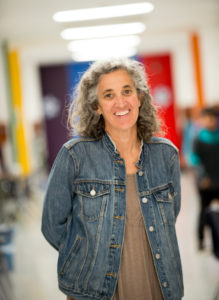How to Get Unstuck. This is one of the most important lessons we can teach in school. Because the truth is, we all get stuck, all the time. Life is like that. And when we know how to get unstuck, we can move forward. But if we get stuck and stay stuck, doors close.
Emma stared at the page. Stared at the page. She knew there were words down there that were supposed to explain ideas she was meant to understand and that they were meant to tell her what to do next, what to write. She watched her hunched classmates, some drawing. She stared back at the page: paleolithic correlation artifacts sedimentary evidence successive technology alluvial plain… She raised her hand, whispered “Can I use the bathroom?” Excused. A few minutes later, back. The dense text on the page was still there, confusing her. She wiggled her pencil around in the margins. “Can I get a drink?” Her busy teacher gave her a nod, and off she went again to the freedom of the hallway, took the long way to the very cold drinking fountain by the stairs. As the water washed past her lips, she wondered how long until lunch and whether her classmates might have moved on to something else if she walked slowly back down the hall.
Emma is stuck. Millions of students like her get stuck every day and then resort to coping strategies that do not serve them as learners. But what if they knew another way? What if students learned agency?
Agency
Agency is essentially a belief in one’s own capacity, one’s ability to control her own life. Agency is an orientation towards the past, present and future that reflects free choice, optimism, and conscious influences; agency means knowing one can act with intention and see productive results. Some of us are born like that; some of us are raised like that; all of us need to learn agency in new and different ways across the timelines of our lives.
To have agency, or to be agentic, in school means to be a problem solver – someone who knows how to get herself unstuck when, like Emma, stymied by a complex text. Teaching agency involves imparting to learners a distinct set of dispositions and skills, including:
- optimism, “I can do this.”
- motivation, “I want to do this.”
- resourcefulness, “I can find tools, strategies and allies to help me.”
Strategies for Agency
The thinking strategies, first uncovered decades ago by Pearson and Gallagher (1983), affirmed by a posse of researchers and still confirmed, are more relevant today than ever. These are tools that support agentic students’ independence as meaning makers. Once hopeful and motivated, we get ourselves unstuck when we:
- Draw on background knowledge
- Ask questions
- Infer
- Develop sensory images
- Determine importance
- Synthesize, and
- Monitoring for meaning
Time tested, true to humans of all ages and backgrounds, these strategies can be taught to learners as a means to increase their own agency at school and in life. When we teach strategies, we are in effect saying to students, “You can do this. Here are some tools. Let’s practice together.” With thinking strategies, learners like Emma have something other to try than the drinking fountain.

